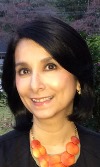IndiaScope: Reflections on a Buoyant India

On a recent visit, TINAZ PAVRI found India in a place that was palpably different from the United States in some respects, and recognizably similar in others.
First the differences. India seems to have emerged from the pandemic with strength. Indeed, memories of lockdowns and idling workers have given way to the reality of breakneck construction, routine traffic jams, and an economy that is very much in high gear. Whereas layoffs in the U.S. that ricocheted through corporate America, the real estate industry, and consultancies have created the prospect of imminent recession and market gloom, in India jobs are being created and business spreadsheets are in the black after the Adani scare. The bank failures and consequent buyouts that happened in the U.S. are not a fear in India.
Infrastructure construction is making cities like Mumbai even more chaotic, but their scope is bold and seeks to be a game-changer from the network of old clogged arteries, despite India’s immense growth in population to officially become the world’s most populous country today. Mumbai is building a coastal road that will provide a north-south alternative to the dysfunctional interior roads. Although it’s an unsightly blight on the famed Mumbai seascape, people seem to understand and support its necessity. The Metro is being simultaneously built, making many major routes hard to navigate, but the sentiment seems to be the same—pain now for gain later.
Small advances like air-conditioned coaches may lure well-heeled customers back to local trains and persuade them to eschew their cars. There is optimism about the future, and I can’t help but contrast that with the gloom I left behind in America—job losses, bank failures, untamed inflation, climbing debt, and falling personal savings—as people are seeking to just hold on.
Other momentous changes are underway as well. The Supreme Court is currently hearing a petition for marriage equality brought by the LGBTQIA community after decriminalization a few years ago. The fact that the Supreme Court has chosen to hear the case is momentous in itself. The arguments by the petitioners are thoughtful and passionate, some of them coming from lawyers who are themselves gay and in committed relationships that they touchingly reveal they cannot give a name to unless marriage equality is the law of the land. Questions by the justices led by Chief Justice Chandrachud are fair and sympathetic. But the course of justice will not be easy. Even as one hears these eloquent pleas, there are untold hate-filled and ignorant social media posts against marriage equality in the name of culture and tradition.
Especially disheartening is the stance of the Bar Council of India, which gave up neutrality by chiding the Supreme Court for hearing the issue. I am reminded of the days of the gay marriage debates in America, and the seemingly insurmountable hurdles that appeared to disappear overnight once the law was passed. It will be interesting to see how far the Indian government will continue to oppose marriage equality. Basking in the glow of India’s increased strategic importance in the wake of the Ukraine war, its G20 leadership and its strengthening global stature, the government might choose caution rather than opposition.
In the political sphere, Congress Party leader Rajiv Gandhi was found guilty in the defamation case against him for insinuating, in open remarks, to those with the prime minister’s last name of being criminals. As of now, the Sessions Court in Gujarat has dismissed his pleas for a stay in the verdict. This, like most other situations, divides Indians depending on where their political loyalties lie. Those who support the PM claim that no one is above the law, while others see this as yet another means of eliminating the political opposition, and play up scenes of a serene Gandhi giving up his official residence now that he is no longer a member of Parliament. This split seems very similar to the bitterly divided nature of American politics, where every situation is interpreted through the eyes of who and what one supports. Like Gandhi, Trump being charged is the turning wheels of righteous justice or the inversion of it, depending on who you ask.
Since the pandemic and then the Ukraine crisis, there’s no doubt that the world’s biggest democracies are dealing with the ensuing dislocations in different ways, with varying outcomes.

Tinaz Pavri is Professor of Political Science and Director of the Asian Studies Program at Spelman College, Atlanta. A recipient of the Donald Wells Award from the Georgia Political Science Association, she’s the author of the memoir Bombay in the Age of Disco: City, Community, Life.
Enjoyed reading Khabar magazine? Subscribe to Khabar and get a full digital copy of this Indian-American community magazine.
blog comments powered by Disqus











